人教新目标Unit-4-Don't-eat-in-class知识点解析
人教新目标七年级英语下册课堂笔记思维导图UNIT 4 Don't eat in class

keep away from
远离
keep doing sth.
继续做某事
keeper
饲养员;看守人;保管人
Section B 重点词汇
18. hair n. 头发;毛发
My mother has a few white hairs
black hair straight hair
u hair 作“头发”讲时,为不可数名词 u 强调“几根毛发”或头发的特征时,为可数名词
many
adj. 很多
much
adj. 很多
Do you want some more meat?
Section B 重点词汇
8. noisy adj. 吵闹的
反:quiet
安静的
noise
噪声
Turn the TV down, it’s too noisy.
Section B 重点词汇
9. relax v. 放松;休息
近: rest
休息
relaxed
感到放松的
relaxing
令人轻松的
You can relax in the living room.
Section B 重点词汇
10. read v. 读;阅读
I like reading.
read the newspaper
看报
read books
看书
She is wearing a white dress today.
wear a hat
戴着一顶帽子
wear glasses
戴眼镜
Section A 重点词汇
9. important
adj. 重要的
It’s very important to take your ID card when you travel.
Unit4Don‘teatinclass单词用法精讲人教版英语七年级下册
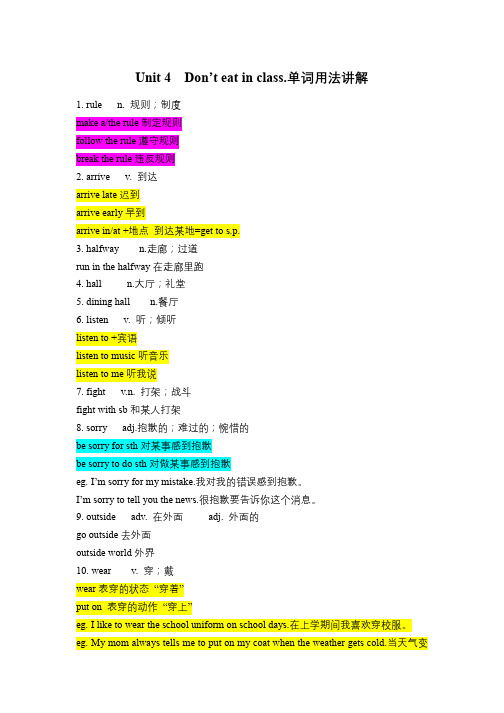
Unit 4 Don’t eat in class.单词用法讲解1. rule n. 规则;制度make a/the rule制定规则follow the rule遵守规则break the rule违反规则2. arrive v. 到达arrive late迟到arrive early早到arrive in/at +地点到达某地=get to s.p.3. halfway n.走廊;过道run in the halfway在走廊里跑4. hall n.大厅;礼堂5. dining hall n.餐厅6. listen v. 听;倾听listen to +宾语listen to music听音乐listen to me听我说7. fight v.n. 打架;战斗fight with sb和某人打架8. sorry adj.抱歉的;难过的;惋惜的be sorry for sth对某事感到抱歉be sorry to do sth对做某事感到抱歉eg. I’m sorry for my mistake.我对我的错误感到抱歉。
I’m sorry to tell you the news.很抱歉要告诉你这个消息。
9. outside adv. 在外面adj. 外面的go outside去外面outside world外界10. wear v. 穿;戴wear表穿的状态“穿着”put on 表穿的动作“穿上”eg. I like to wear the school uniform on school days.在上学期间我喜欢穿校服。
eg. My mom always tells me to put on my coat when the weather gets cold.当天气变冷的时候,我妈妈总是告诉我穿上外套。
11. important adj. 重要的12. bring v. 带来;取来bring的对应词take “带走”bring sth to sb= bring sb sth把某物带给某人eg. We can’t bring music players to school.我们不能把音乐播放器带到学校。
人教版 Unit 4 Don't eat in class知识点 + 练习讲义设计(无答案)

You________ ________do your homework every day. 4.He has to get up before 6:10 every morning.( 改为一般疑问句,并作肯定回答 ) —________he________ ________get up before 6:10 every morning? —________,he________. 5.They have to wash their hands before meals.( 对画线部分提问 ) ________ ________they________ ________ ________before meals?
~ to do sth . 记得去做某事 ~ dI never have any fun. (never 译为“从来没有”,表示否定,否定句中表示“任何,一些”,用 any)
13. 表示“时间”的词组: (1) 下课后:after class 放学后:after school (2) 在上学的白天/晚上:on school days/nights 比较:at night
3. You don't ______wash all the plates after meals.
A.have to B.must C,may
D.has to
5.---Must I clean the window now?
---No,you_______.
A.musn’t B.needn’t C.can’t 四、按要求完成句子,每空一词 1.Mike has to clean his bedroom at home.( 改为否定句 ) Mike________ ________ ________clean his bedroom at home. 2.You must do your homework every day.( 改为同义句 )
初中英语人教版七年级下册Unit 4 Don’t eat in class知识点整理

七年级英语下册Unit4知识点【Useful expressions】1.No talking 不许讲话 (No+动词ing,禁止......)2.the school rules 校规3.eat in class 上课吃东西4.run in the hallways 在过道上追逐打闹5.in the dining hall 在食堂6.fight with sb.=have a fight with sb.和某人打架7.go out on school nights 在上学期间的晚上外出8.on school days 在上学的日子9.arrive late for class= be late for class 上课迟到了10.wear a/the uniform 穿制服11.have to 不得不;必须12.eat outside 外面吃东西13.practice doing sth.练习做某事14.help mom make breakfast 帮助妈妈做早饭17.too many 太多(+可数复数)18.too much 太多(+不可数)19.so many 如此,这么多的(+可数名词复数)20.so much 如此,这么多的(+不可数名词)21.library rules 图书馆规则22.be strict with sb.in sth.在某方面对某人严格23.be quiet 安静24.be noisy 吵闹25.make the teacher unhappy 惹老师不高兴26.make a noise/make noises 制造噪音27.do the dishes 洗碗28.stay at home呆在家里29.on time 准时30.in time 及时31.learn to do sth.学习做某事32.learn from sb.向某人学习33.follow / keep /obey the rules 遵守规定34.break the rules 破坏规则35.make rules 制定规则36.keep one’s hair short 留短发37.think about 考虑38.make one’s bed 铺床39.in your home 在你家40.at home 在家41.Good luck to you! 祝你好运42.remember doing sth.记得做过某事43.remember to do sth 记得去做某事44.listen to sb.听某人说【Target sentences】1.--What are the rules?--Well, you must be on time for class.Don't fight with your classmates.2.We can’t listen to music in the classroom or hallways.3.--Can we bring music players to school?--Yes, we can./No, we can’t.4.And we always have to wear the school uniform.5.--Does he have to wear a uniform at school?--Yes, he does./No, he doesn't.6.--What do you have to do?--We have to be quiet in the library.7.Don't leave the dirty dishes in the kitchen.8.My dad says I can’t play basketball after school because I must do my homework.9.After dinner, I can’t relax,either.I must read a book before I can watch TV.10.I know how you feel.11.There are a lot of things you can do.12.Parents and schools are sometimes strict but remember, they make rules to help us.13.I think it’s best to follow the rules.14.I can’t go out on school nights.15.I have to do my homework after school.16.I must practice the guitar before dinner.【Language points】1.Don’t arrive late for class.(1)arrive v.到达;是不及物动词,若接地点名词,要加介词in或at。
人教版英语七年级下册-Unit-4-Don't-eat-in-class-语法解析

2021/2/4
1
6
疑问句: must 提前,回答时注意一二人称的互换。肯定用 must, 否定用needn’t. e.g. --Must I go home now?
-- Yes, you must. -- No, you needn’t.
B: And I must clean my room every Saturday. =?
A: Wow, you do have a lot of rules!
2021Dr. Know, There are too many rules! At 6:00 a.m. my mom says, “Get up now and make your bed!”
too many rules “太多的规定”, 其中too many 用来 修饰可数名词复数rules。 e.g. He has too many friends to meet.
修饰不可数名词时, 要用too much e.g. We have too much work to do.
much too 太……much 用来增强语气。后接形容 词或副词。
What can I do. Dr. Know? Molly Brown, New York
表“看”的单词?
either 也。用于否定句和疑问句中。肯定句中用too 表也。
watch,see,look r,read
2021/2/4
1
13
Dear Molly, I know how you feel. People always tell us, “ Don’t do this!” or “You can’t do that!” But think about it, Molly. There are a lot of things you can do. You can play basketball on weekends. You can watch TV after you read a book. Parents and schools are sometimes strict,
初中英语_ Don’t eat in class 教学设计学情分析教材分析课后反思

Unit4. Don’t eat in class. Section B 1a—2c【学习目标】一、知识目标:1. 掌握本课单词: dirty, kitchen, more, noisy, relax, read, terrible, feel, strict, remember, follow, luck2. 重点短语:make one’s bed, be strict (with sb.), follow the rules, too many rules, read a book, good luck,3. 重点句子:1) There are too many rules!2) Get up now and make your bed3) Don’t leav e the dirty dishes in the kitchen.4) I must read a book before I can watch TV.5) I know how you feel.6) You can watch TV after you read a book.二. 能力目标:1.读熟单词, 2.根据问题快速浏览信息的能力 3. 提取有效信息的能力。
三. 情感目标:1.试着站在家长,老师的角度看待家规,懂得“规则”的必要性2. 在遇到压力和烦恼时可以寻找心理医生等健康途径疏导,解决。
【教学方法】:讲练结合,听说结合【教学用具】:多媒体辅助教学【授课类型】:新授课【学习重点】1.重点词汇:dirty, kitchen, noisy, relax, read, terrible , strict remember, follow, luck2重点短语:read a book,make one’s bed, be strict (with sb.), follow the rules, too many rules【学习难点】1用目标语言谈论对某些规章制度(校规、家规等)的看法2. 重点语法知识点。
2019-2020年人教版英语七年级下册 Unit4 Don't eat in class单元知识
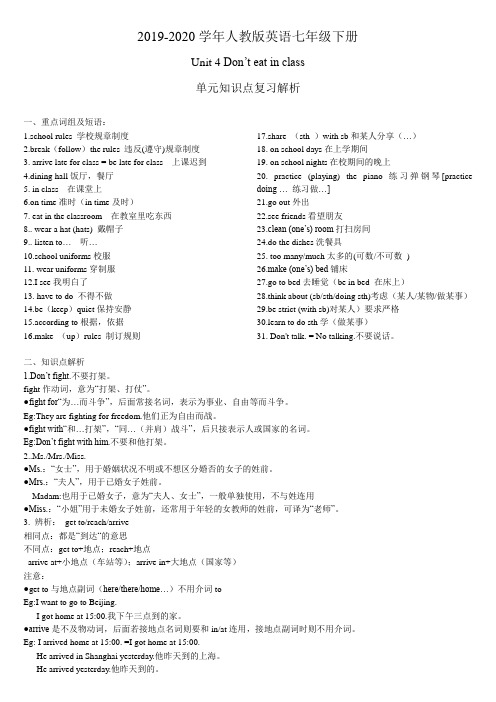
2019-2020学年人教版英语七年级下册Unit 4 Don’t eat in class单元知识点复习解析一、重点词组及短语:1.school rules 学校规章制度2.break(follow)the rules 违反(遵守)规章制度3. arrive late for class = be late for class 上课迟到4.dining hall饭厅,餐厅5. in class 在课堂上6.on time准时(in time及时)7. eat in the classroom 在教室里吃东西8.. wear a hat (hats) 戴帽子9.. listen to…听…10.school uniforms校服11. wear uniforms穿制服12.I see我明白了13. have to do 不得不做14.be(keep)quiet保持安静15.according to根据,依据16.make (up)rules 制订规则17.share (sth )with sb和某人分享(…)18. on school days在上学期间19. on school nights在校期间的晚上20. practice (playing) the piano 练习弹钢琴[practice doing … 练习做…]21.go out外出22.see friends看望朋友23.clean (one’s) room打扫房间24.do the dishes洗餐具25. too many/much太多的(可数/不可数)26.make (one’s) bed铺床27.go to bed去睡觉(be in bed 在床上)28.think about (sb/sth/doing sth)考虑(某人/某物/做某事)29.be strict (with sb)对某人)要求严格30.learn to do sth学(做某事)31. Don't talk. = No talking.不要说话。
Unit4Don’teatinclass知识点总结人教版七年级英语下册

Unit 4 Don’t eat in class知识点总结短语归纳1in class 在课堂上 2arrive in/at 到达 3arrive late for 迟到 4be late for 迟到 5(be) on time 准时 6in the hallways 在走廊上 7listen to 听 (8)at shool 在学校 9bring...to... 带...到 (10)have to 必须,不得不 11fight with sb 和某人打架 12go out 外出 13on school nights 在学校的晚上 14practice doing sth 练习做某事 15do the dishes 清洗餐具 16make breakfast 做早饭 17make one's bed 整理床铺 18read a book 看书 19be strict with sb 对某人要求严格 20be strict in sth 对某事要求严格 21follow the rules 遵守规则 22make rules to do sth 制定规则 23good luck 好运 24too many 太多+可复 25too much 太多+不可 26 much too 太…用法集萃 典句必背 1. Don’t arrive late for class. 上课不要迟到。
2. Can we bring music players to school? 我们可以带音乐播放器到学校吗? 3. And we always have to wear the school uniform. 并且我们总是不得不穿校服。
4. There are too many rules! 有太多的规则! 5. Don’t leave the dirty dishes in the kitchen! 不要把脏盘子留在厨房里! 6. I have to keep my hair short. 我不得不留短发。
改版后新目标七年级下册第四单元英语知识点总结.
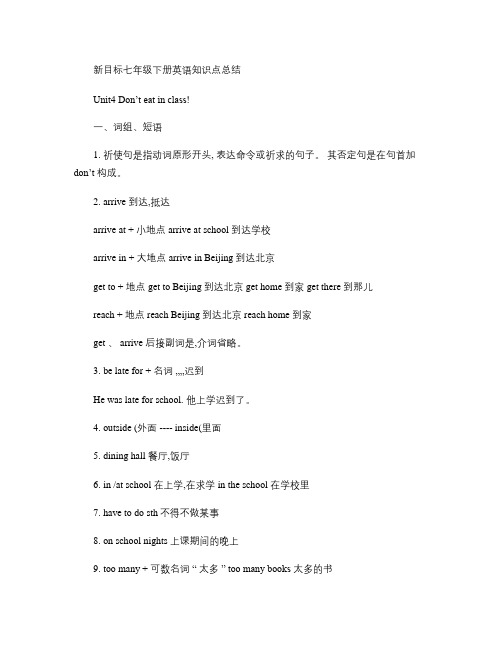
新目标七年级下册英语知识点总结Unit4 Don’t eat in class!一、词组、短语1. 祈使句是指动词原形开头, 表达命令或祈求的句子。
其否定句是在句首加don’t 构成。
2. arrive 到达,抵达arrive at + 小地点 arrive at school 到达学校arrive in + 大地点 arrive in Beijing 到达北京get to + 地点 get to Beijing 到达北京 get home 到家 get there 到那儿reach + 地点 reach Beijing 到达北京 reach home 到家get 、 arrive 后接副词是,介词省略。
3. be late for + 名词……迟到He was late for school. 他上学迟到了。
4. outside (外面 ---- inside(里面5. dining hall 餐厅,饭厅6. in /at school 在上学,在求学 in the school 在学校里7. have to do sth不得不做某事8. on school nights 上课期间的晚上9. too many + 可数名词“ 太多” too many books 太多的书too much + 不可数名词“ 太多” too much homework 太多的家庭作业10. No smoking! = Don’t smoke! 请勿吸烟!No food! = Don’t eat food! 禁止吃东西!No + 名词(短语或动词 -ing 形式,表示“ 不许,不可,不能”11. later 后来,以后12. by “在…… . 以前,到……为止”I should finished homework by tomorrow.在明天之前我应该把作业做完。
13. be in bed “睡觉,卧床” in bed “卧病在床” in the bed “在床上”go to bed “上床睡觉”强调动作二、重点句型1.Don’t arrive late for school=Don’t be late for school2.Don’t fight3.Don’t listen to music in the classroom.4.Don’t run in the hallways5.Don’t smoke .It’s bad for your health.6.Don’t play cards in school7.Don’t talk in class8.Don’t watch TV on school nights.9.Don’t sleep in class.10.Don’t play sports in the classrooms.11.Don’t sing songs at night.12.Don’t talk when yo u eat.13.Don’t wear hats in class.14.Do homework by 10:00.15.Clean your house!16.Make the bed.17.Can we ……? Yes ,we can . No, we can’t.Eg: Can we arrive late for class ?No, we can’t. We can’t arrive late for class.18.Do you have to wash your clothes? Yes, I do./No, I don’t.三、重点句子1. Don’t arrive late for class.2. Don’t run in the hallways.3. Don’t eat in the classrooms.4. Don’t listen to music in the classrooms or the hallways.5. Don’t fight.6. What are the rules?7. Can we listen to music?8. Do you have to wear a uniform at school?9. What else do you have to do ?10. Don’t go out on school night.11. Practice your guitar every day .12. I have too many rules in my family.13. I can’t meet my friends after school because I have to do my homeworkl14. I have to be in bed by ten O’clock.15. I have to help my Mom make dinner.16. Later , I have to go to the Children’s Palace to learn the piano.17. I never have any fun, what can I do?四、重难点精析祈使句通常用来表示命令、请求、禁止、建议、警告等语气。
Unit 4 Don't eat in class.知识点讲义 2022-2023学年人教

Unit 4 Don't eat in class.知识点讲义2022-2023学年人教版英语七年级下册(含答案)2024年人教版初中英语七年级下册Unit 4知识点讲义(含巩固练习)Unit 4 Don’t eat in class.Section A1.Don’t eat in class. 意为:“不要在课上吃东西。
”该句为祈使句,表示一种命令、请求、禁止等语气。
其肯定结构常用动词原形开头,否定结构常用don’t开头。
Eg: Be quiet. “保持安静。
”2.in class “在课堂上”3.School rule “校规”Rule (名) “规矩、规则、控制”Rule (动) “统治、支配、用直尺画线”Make rules “制定规则”4.Don’t arrive late for class. “不要上课迟到。
”(1) Arrive用法见Unit 2 Section B第9点笔记(2)be late for... “迟到...”5.You must be on time. “你必须守时。
”(1)must为情态动词,表示“必须;务必”等意,有时还表示“一定”,起到加强语气的作用。
其没有人称时态的变化,后面加动词原形。
Eg: I must do my homework right now. “我必须立刻做作业。
”(2)on time “按时;准时” in time “及时”6.Don’t listen to music in class. “上课时不要听音乐。
”Listen to music “听音乐”7.Don’t fight. “不要打架。
”Fight with sb. “和某人打架”8.Wear a hat “戴帽子”Wear详解请参考Unit 2 Section A 第3点笔记9.Some of the rules “其中的一些规矩”10.Important (形容词) “重要的”其派生词为:importance (名词) “重要性”11.Bring (动) “带来”,从别处带到说话人处Take (动) “带去”从说话人处带到别处12.Have to “必须;不得不” 有被迫之意而must有主动之意13.School uniform “校服”14.I see. “我懂了;我明白了。
人教版新目标七年级下册英语unit4到unit6知识点总结和单元检测
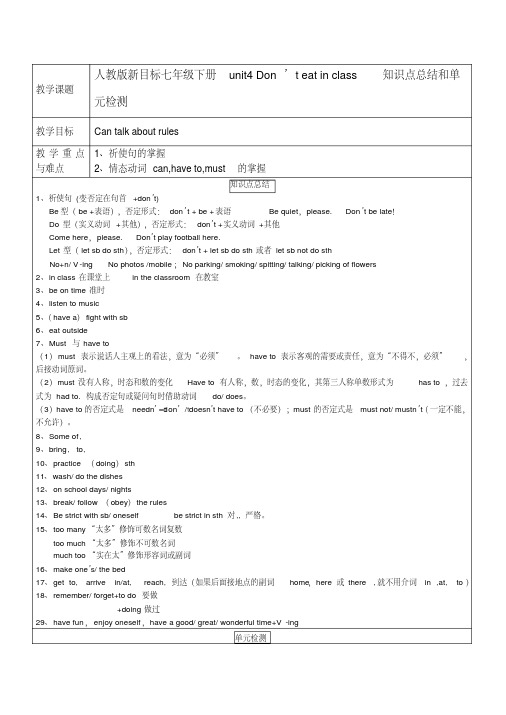
教学课题人教版新目标七年级下册unit4 Don’t eat in class知识点总结和单元检测教学目标Can talk about rules教学重点与难点1、祈使句的掌握2、情态动词can,have to,must的掌握知识点总结1、祈使句(变否定在句首+don’t)Be型(be +表语),否定形式:don’t + be +表语Be quiet,please. Don’t be late!Do型(实义动词+其他),否定形式:don’t +实义动词+其他Come here,please. Don’t play football here.Let型(let sb do sth),否定形式:don’t + let sb do sth或者let sb not do sthNo+n/ V-ing No photos /mobile;No parking/ smoking/ spitting/ talking/ picking of flowers2、in class在课堂上in the classroom 在教室3、be on time准时4、listen to music5、(have a)fight with sb6、eat outside7、Must 与have to(1)must 表示说话人主观上的看法,意为“必须”。
have to 表示客观的需要或责任,意为“不得不,必须”,后接动词原词。
(2)must没有人称,时态和数的变化Have to 有人称,数,时态的变化,其第三人称单数形式为has to ,过去式为had to. 构成否定句或疑问句时借助动词do/ does。
(3)have to的否定式是needn’t=don’t/ doesn’t have to (不必要);must的否定式是must not/ mustn’t(一定不能,不允许)。
8、Some of,9、bring,to,10、practice (doing)sth11、wash/ do the dishes12、on school days/ nights13、break/ follow(obey)the rules14、Be strict with sb/ oneself be strict in sth对,,严格。
新目标英语七年级下册_Don't_eat_in_class.讲解与练习
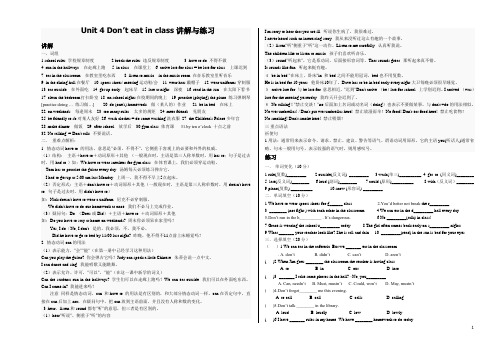
Unit 4 Don’t eat in class讲解与练习讲解一、词组1.school rules 学校规章制度2.break the rules 违反规章制度3. have to do 不得不做4. run in the hallways 在走廊上跑5. in class 在课堂上6. arrive late for class = be late for class 上课迟到7. eat in the classroom 在教室里吃东西8. listen to music in the music room 在音乐教室里听音乐9. in the dining hall在餐厅10. sports shoes/ meeting运动鞋/会11. wear hats戴帽子12. wear uniforms穿制服13. eat outside 在外面吃14. get up early 起床早15. late at night 深夜16. read in the sun 在太阳下看书17. clean the bedroom打扫卧室18. on school nights在校期间的晚上19. practice (playing) the piano 练习弹钢琴[practice doing … 练习做…]20. do (one's) homework 做(某人的)作业21. be in bed 在床上22. on weekends 每逢周末23. too many rules 太多的规矩24. meet friends 见朋友25. be friendly to sb.对某人友好26. wash clothes = do some washing洗衣服27. the Children's Palace少年宫28. make dinner 做饭29. after school 放学后30.gym class 体育课31.by ten o’clock 十点之前32. No talking. = Don't talk. 不要说话。
Unit4-Don't-eat-in-class语法

球。
2.Let him not play volleyball.
不 要 让 鲍 勃 唱 歌了。
3.Don't let Bob sing.
4.Let Bob not
sing.
拓展:
英语中有些祈使句以no开头,其后 常接名词或动词-ing形式,用来表示 禁止做某事。
No talking/ No smoking/ No parking/ No photos
Conclusion
1. 祈使句:Do型 Be型 Let型 否定形式和肯定形式,其中Let
型有两种否定形式。 2.Must/have to 两者的区别与否定形式
肯定形式:
Be型
安静 小心 快点儿
Be+表语(名词或 形容词)+其他成 分
Be quiet. Be careful. Be quick.
肯定形式:
Let型
Let+宾语+动词原
形+其他成分
让 我 吧。
让 我
们 们
打 下
篮 球 L e t u s p 棋 吧 。 basketball.
l
a
y
L e t u s p l a y
classroom. 4. Don't watch TV after school.
否定形式:
L e t 型 的 否 定 1.Don't let
式有两种: +宾语+动词原
形+其他
2 . L e t + 宾 语
+not+动词原
形&#him
不 要 让 他 打 排 play volleyball.
Unit 4
Unit4-don't_eat_in_class知识点含练习
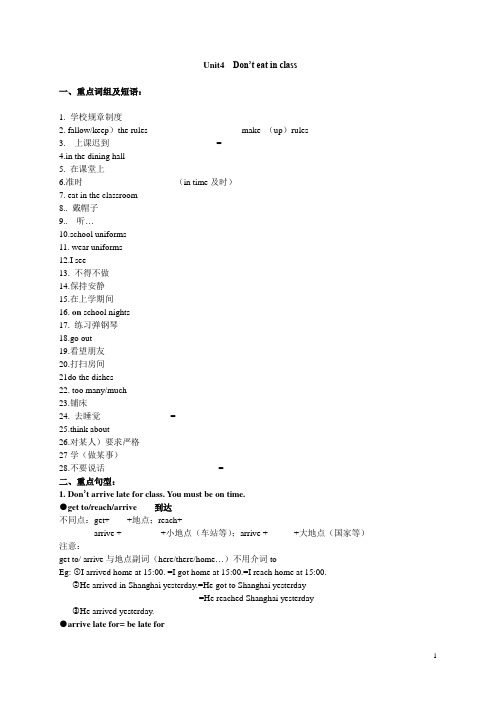
Unit4 Don’t eat in class一、重点词组及短语:1. 学校规章制度___________________2. fallow/keep)the rules ___________________ make (up)rules__________________3. 上课迟到________________________ = ______________________________4.in the dining hall_____________________5. 在课堂上______________________6.准时_____________________(in time及时)7. eat in the classroom _________________________________8.. 戴帽子______________________________9.. 听…__________________________________10.school uniforms___________________________________11. wear uniforms___________________________________12.I see______________________________________13. 不得不做__________________________________14.保持安静___________________________15.在上学期间____________________16. on school nights__________________________17. 练习弹钢琴___________________________18.go out____________________________19.看望朋友___________________________20.打扫房间___________________________________21do the dishes___________________________22. too many/much__________________________23.铺床__________________________24. 去睡觉________________=___________________________25.think about_______________________26.对某人)要求严格______________________________27学(做某事)_____________________________________28.不要说话__________________________=__________________二、重点句型:1. Don’t arrive late for class. You must be on time.●get to/reach/arrive 到达不同点:get+____+地点;reach+________arrive +_________+小地点(车站等);arrive +______+大地点(国家等)注意:get to/ arrive与地点副词(here/there/home…)不用介词toEg: ①I arrived home at 15:00. =I got home at 15:00.=I reach home at 15:00.②He arrived in Shanghai yesterday.=He got to Shanghai yesterday=He reached Shanghai yesterday③He arrived yesterday.●arrive late for= be late for●on time“准时,按时”,指按规定的时刻不早不晚。
Unit4 单元知识点总结课件--七年级英语下册(人教版)

No+ 动词-ing 禁止做某事
No smoking.
Let sb not do sth
让…不要做某事
Let them not go.
相关链接: Let’s+动词原形 Vs. Let us+动词原形
Let us+动词原形:通常不包括听话者在内;省略主语you Let us watch TV. (“你让我们”;说话者和听话者不一起)
2.___________exercising, and you’ll be healthier.
A.Keep
B.To keep
3.Jack, ___________here, and I will give you a present.
A.comes
B.come
4. _____ quiet, please. We are in the reading room.
have to
强调客观需要 有人称/时态变化 It’s too late. We have to go home now.
单项选择
1.——Hey, Ted! You ___________never play in the street. It’s not safe.
——Sorry, Mum. I won’t again.
—— OK! I’ll be there soon.
A.fetch
B.take
C.bring
3.It’s cold outside. You should ___________a coat with you.
A.bring
B.take
C.get
4.—— I’m sorry I left my homework at home. Must I go and ___________it?
七年级英语下册 Unit 4 Don’t eat in class短语、语法知识点汇总 (新版)人教新目标版

Unit 4 Don’t eat in class 一、基础归纳【教材内容解析】Section A1.Don’t arrive late for class. (P. 19)arrive作不及物动词,表示“到达”,接宾语时,需要加上介词in或者at。
When did you arrive?We are arriving at the station at two o’clock.【拓展】reach表示“到达”时,是及物动词,后面直接接表示地点的名词作宾语。
另外两个表示“到达”的动词(get和arrive)都是不及物动词,get to+地点;arrive in/at+地点。
After a long way, they reached/got to/arrived at the top of the mountain finally.2.You must be on time. (P. 19)on time用作固定短语,表示“准时、按时”,in time表示“及时”。
The train arrives on time.The ambulance(救护车) arrives in time.3.Don’t listen to music in class. (P. 19)listen用作不及物动词,表示听的动作,后接宾语时,需要加上介词to,hear强调听的结果,表示“听到”。
This girl likes to listen to music.Can you hear anything?4.Don’t fight. (P. 19)fight此处用作动词,意为“打架”,fight with sb.意为“与某人打架”。
Why do you sometimes fight with others?5.listen to music outside (P. 20)outside表示“在外边”,反义词为inside“在……里面”。
新版新目标英语七年级下unit4--Don't-eat-in-classPPT课件
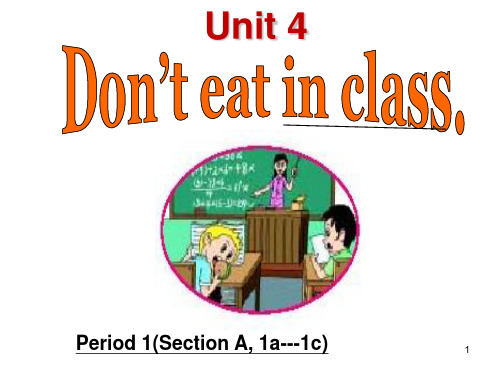
Don’t listen to music in class.
.
11
Can you fight in school?No, we can’t.
Don’t fight .
.
12
Words &Expressions on Page 19
• rule n. 规则;规章
• arrive v. 到达
permission. • Get the Ss to know what they can do and what they
can’t do. • Have the Ss learn how to expore sth by group work. • Get the Ss to know wesern culture about schools.
3
4
2. Don’t run in the hallways.
Don’t run in the hallways.
3. Don’t eat in the classroom. You must eat in the dining hall.
4. Don’t listen to music in class.
• ( be )on time 准时
• hall n. 大厅;礼堂
• hallway n. 走廊
• dining hall 餐厅
• listen v. 听;倾听
• listen to... 听.......
• fight v. & n. 打架;战斗
• sorry adj. 抱歉的;难过的;惋惜的
13
Don’t+动词原形+其他.(,please.)
七年级英语下册Unit-4-Don't-eat-in-class知识点总结

Unit 4 Don’t eat in class一、重点词组及短语1。
school rules 学校规章制度17。
share (sth.)with sb。
和某人分享2. break the rules 违反规章制度18. make (up)ruler 制订规则3。
fallow/keep the rules 遵守规章制度19。
learn to do sth. 学(做某事)4. arrive late for class = be late for class20. on school days在上学期间上课迟到5。
dining hall饭厅,餐厅21。
on school nights在校期间的晚上6。
in class 在课堂上22. practice (playing) the piano 练习弹钢琴7。
on time准时(in time及时)23。
go out外出8. eat in the classroom 在教室里吃东西24. see friends看望朋友9. wear a hat (hats) 戴帽子25. clean (one’s)room打扫房间10。
listen to music 听音乐26. do the dishes洗餐具11。
school uniforms校服27. too many/much太多的(可数/不可数)12。
wear uniforms穿制服28。
make (one’s) bed铺床13。
I see我明白了29. go to bed去睡觉(be in bed 在床上)14. have to do sth。
不得不做30. think about=think of 考虑、认为15。
be(keep)quiet保持安静31. be strict (with sb.)对某人)要求严格16。
according to根据,依据32. Don’t talk. = No talking.不要说话二、知识点解析1. Don’t fight. 不要打架.fight作动词,意为“打架、打仗”。
- 1、下载文档前请自行甄别文档内容的完整性,平台不提供额外的编辑、内容补充、找答案等附加服务。
- 2、"仅部分预览"的文档,不可在线预览部分如存在完整性等问题,可反馈申请退款(可完整预览的文档不适用该条件!)。
- 3、如文档侵犯您的权益,请联系客服反馈,我们会尽快为您处理(人工客服工作时间:9:00-18:30)。
Unit 4 Don’t eat in class知识点讲解一、重点词组及短语:1.school rules 学校规章制度2.break(fallow/keep)the rules 违反(遵守)规章制度3. arrive late for class = be late for class 上课迟到4.dining hall饭厅,餐厅5. in class 在课堂上6.on time准时(in time及时)7. eat in the classroom 在教室里吃东西8.. wear a hat (hats) 戴帽子9.. listen to…听…10.school uniforms校服11. wear uniforms穿制服12.I see我明白了13. have to do 不得不做14.be(keep)quiet保持安静15.according to根据,依据16.make (up)ruler 制订规则17.share (sth )with sb和某人分享(…)18. on school days在上学期间19. on school nights在校期间的晚上20. practice (playing) the piano 练习弹钢琴[practice doing …练习做…]21.go out外出22.see friends看望朋友23.clean (one’s) room打扫房间24.do the dishes洗餐具25. too many/much太多的(可数/不可数)26.make (one’s) bed铺床27.go to bed去睡觉(be in bed 在床上)28.think about (sb/sth/doing sth)考虑(某人/某物/做某事)29.be strict (with sb)对某人)要求严格30.learn to do sth学(做某事)31. Don't talk. = No talking.不要说话。
二、知识点解析1.Don’t fight.不要打架。
fight作动词,意为“打架、打仗”。
其过去式为fought.●fight for“为…而斗争”,后面常接抽象名词,表示为事业、自由等而斗争。
Eg:They are fighting for freedom.他们正为自由而战。
●fight against“为反对…而战斗”,后接事物名词、人和国家名词。
Eg: They fought against the enemy.他们和敌人作战。
●fight with“和…打架”,“同…(并肩)战斗”,后只接表示人或国家的名词。
Eg:Don’t fight with him.不要和他打架。
【典型例题】They fought ________the Italians in the last war,but________them in this war.A. with; withB. with;forC. against ; againstD.with; against2..Ms./Mrs./Miss.●Ms.:“女士”,用于婚姻状况不明或不想区分婚否的女子的姓前。
●Mrs.:“夫人”,用于已婚女子姓前。
Madam:也用于已婚女子,意为“夫人、女士”,一般单独使用,不与姓连用●Miss.:“小姐”用于未婚女子姓前,还常用于年轻的女教师的姓前,可译为“老师”。
3. 辨析:get to/reach/arrive相同点:都是“到达“的意思不同点:get to+地点;reach+地点arrive at+小地点(车站等);arrive in+大地点(国家等)注意:●get to与地点副词(here/there/home…)不用介词toEg:I want to go to Beijing.I got home at 15:00.我下午三点到的家。
●arrive是不及物动词,后面若接地点名词则要和in/at连用,接地点副词时则不用介词。
Eg: I arrived home at 15:00. =I got home at 15:00.He arrived in Shanghai yesterday.他昨天到的上海。
He arrived yesterday.他昨天到的。
●reach是及物动词,后面直接接地点名词或副词。
Eg:When will they reach here?【典型例题】---What time did the team________the top of the mountain?---At about 4:30 p.m.eB.goC.arriveD.arrive at4. ●on time“准时,按时”,指按规定的时刻不早不晚。
Eg:He always go to school on time.他总是按时上学。
●in time“及时”,指没有迟到,时间还充裕。
Eg:Fireman reached the house on fire in time.消防员及时赶到那幢失火的房子。
5.hear、listen和sound都有"听"的意思,但三者是有区别的:●hear"听说""听"的内容。
Eg:I'm sorry to hear that you are ill. 听说你生病了I never heard such an interesting story. 我从来没听过这么有趣的一个故事。
●listen"听"侧重于"听"这一动作。
Eg:Listen to me carefully. 认真听我说。
The children like to listen to music. 孩子们喜欢听音乐。
●sound"听起来"Eg:That sounds great. 那听起来真不错。
It sounds like fun. 听起来挺有趣。
【典型例题】________carefully,or you are not able to________anything. (be able to do sth能够做…)A.Hear;listenB.Listen;hearC.Hear;listenD.Listen;listen6.辨析take,bring●take“带走,拿走”指把东西从说话地带到别的地方。
Eg:Can you help me to take the books to the classroom?你能帮我把这些书带到教室里去吗?●bring“带来”指把东西从别处带到说话地。
Eg:Bring your homework here tomorrow,please.请你明天把作业带到这儿来。
【典型例题】________away this dirty shirt and ________me a clean one.A.Take;bringB.Take;takeC.Bring;takeD.Bring;bring7. strict是形容词,意为“严格的”;“严厉的”,通常与be动词连用。
●be strict with sb “对某人严厉”Eg:Mr. White is very strict with us. 怀特先生对我们要求很严格。
We should be strict with ourselves. 我们应该对自己要求严格。
●be strict in (doing) sth “对某事要求严格”Eg:Our boss is strict in our work. 我们的老板对我们的工作要求严格。
8.remember“记得,记住”,是及物动词,可以直接加名词。
●remember doing sth记得已做某事(已做)Eg:I remember seeing him once.我记得见过他一次。
●remember to do sth 记得要做某事(还没做)Eg:Remember to post the letter for me.记得给我寄这封信。
●forget“忘记,忘了”,作remember反义词时,用法和remember相同。
9.help作动词意为“帮助”,常用的结构有:●help sb (to) do sth帮助某人做某事●help sb with sth(n.)帮助某人做某事Eg:I often help him with his lessons.我常帮他学功课。
●help oneself(myself/yourself/herself…) to+n.请随便用…Eg:Please help yourselves to some fruit.请随便吃些水果。
help还可作名词,表示“帮助”,是不可数。
【典型例题】I have ________skirts and this one is ________large for me,so you can take it if you like.A. too mang; too muchB. too much; much tooC. too mang; much too【典型例题】I don’t like her, ________.A.alsoB.tooC.eitherD.to10.have fun=have a good time=enjoy oneself玩得开心,过得愉快12.be in bed "在床上、卧床",in 和bed之间不能用冠词,bed也不用复数。
Eg:He is in bed for 10 years. 他卧床10年了。
Dave has to be in bed early every night.大卫每晚必须很早睡觉。
.13.No talking ! "禁止交谈。
"no后面加上名词或动名词doing也表示不要做某事。
与don't +do的用法相似。
Eg:No wet umbrellas! / Don't put wet umbrellas here! 禁止放湿雨伞No food! Don't eat food here! 禁止吃食物No smoking! Don't smoke here! 禁止吸烟三、重点语法1.情态动词have to 的用法:意思是"必须、不得不"侧重于客观上的必要和外界的权威。
●结构:主语+have to+动词原形+其他●一般现在时:主语是第三人称单数时用has to,其它时候用have to(过去时:无论人称和单复数都用had to.)Eg:We have to wear sneakers for gym class. 在体育课上Tom has to practice the guitar every day. 汤姆每天必须练习弹吉它。
